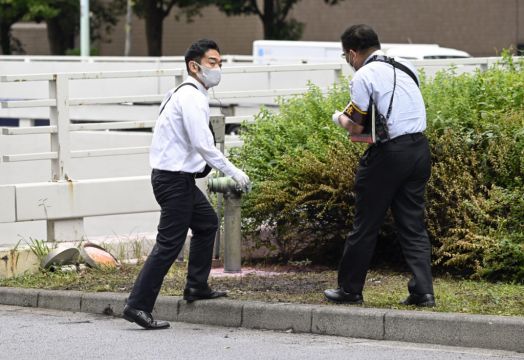A man set himself on fire near the Japanese prime minister’s office in Tokyo in apparent protest against the funeral of former leader Shinzo Abe.
According to officials and media reports, the incident happened early on Wednesday – ahead of the state funeral that is planned for next week.
The man, believed to be in his 70s, sustained burns on large parts of his body but was conscious and told police that he used oil to set himself on fire, Kyodo News agency reported.

A note apparently written by the man was found with him that said, “Personally, I am absolutely against” the funeral for the late former PM, Kyodo reported.
A Tokyo Fire Department official confirmed that a man had set himself ablaze on a street in the city’s Kasumigaseki government district and that he was alive when he was taken to hospital by ambulance, but declined to give further details – including the man’s identity, motive or condition – citing the sensitivity of it being a police matter.
Police called it an attempted suicide and refused to give further details because the case involved no criminal intent. They also declined to comment on a report that a police officer was caught in the fire.
Prime minister Fumio Kishida is in New York for the annual UN General Assembly meeting of world leaders. He gave a speech on Tuesday expressing disappointment over the Security Council’s failure to respond to the Russian invasion of Ukraine because of Russia’s permanent veto and called for reforms that would allow the UN to better defend global peace and order.

The planned state funeral for Mr Abe has become increasingly unpopular among Japanese as more details emerge about the ruling party’s and the former leader’s links to the Unification Church, which built close ties with Liberal Democratic Party (LDP) politicians over their shared interests in conservative causes.
The suspect in Mr Abe’s assassination reportedly believed his mother’s donations to the church ruined his family. The LDP has said nearly half its politcians have ties to the church.
A state funeral is a rare event in Japan, but Mr Kishida has said Mr Abe deserves the honour as Japan’s longest-serving post-World War II leader and for his diplomatic and economic achievements.
Critics have said it was decided undemocratically and is an inappropriate and costly use of taxpayers’ money. They say Mr Kishida aimed to please Mr Abe’s party faction and buttress his own power.







